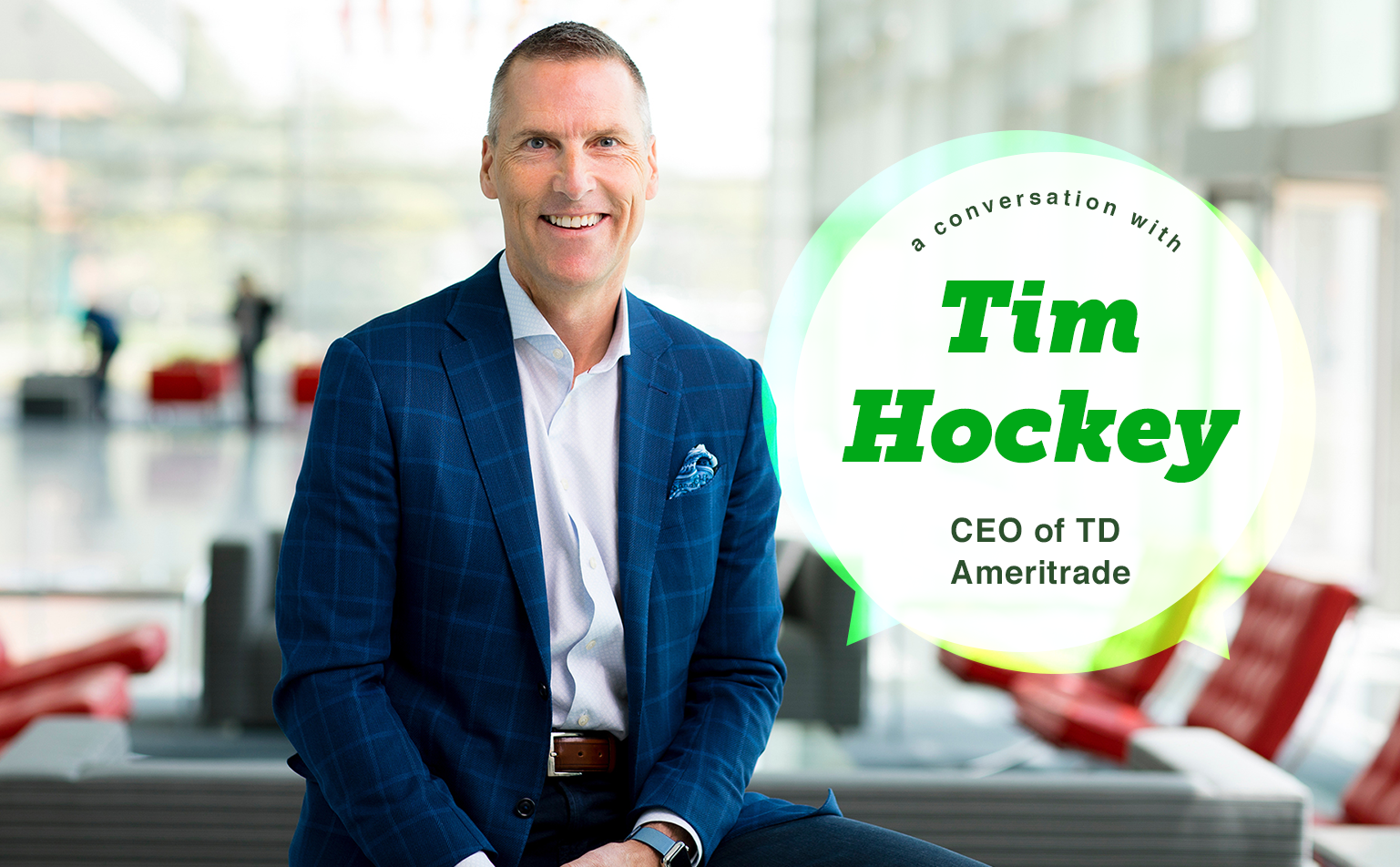Student Life Network recently sat down with another successful business executive as part of SLN’s Executive Leadership Interview Series. Read on to learn what Tim Hockey had to say to us about achieving success.
Who’s the greatest basketball player of all time? The answer to that question depends on who you ask. But there’s a good chance that it will come down to two people: Michael Jordan and LeBron James. Picking one of the two is a difficult, if not impossible, task. Both men played in very distinct eras. In fact, many fans regard the players as 1A and 1B. Could Jordan hold his own in today’s faster, more physical, and more aggressive era? I personally believe that he could. Why? Because he has the composition of a great player—he has all the fundamentals.
Tim Hockey, CEO of TD Ameritrade, reminds me very much of Michael Jordan. He was a fixture of the TD dynasty, having served as Group Head of Canadian Banking and Wealth Management and as President and CEO of TD Canada Trust. Today he leads one of the largest U.S. brokerages as measure by trading volume. He’s also been a past recipient of Canada’s Top 40 Under 40 Award. I believe that even though Tim Hockey cut his teeth at a time so foreign to students today, his fundamental proficiencies—an array of soft skills and technical skills—coupled with the wisdom that only comes from dealing with adversity, would make him successful in any era (past or present).
Part 1: High School

Tim, let’s take it from the top. Take me back to a time well before TD. Before the Richard Ivey School of Business, and even before Carleton University. Let’s actually go back to when you were in high school. Who was Tim Hockey back then?
I wasn’t a huge sports kid. But I wasn’t nerdy either. I was just sort of interested in a lot of different things, generally.
Now that I think about it, I wasn’t very social either; I didn’t fit in any of the cliques that one might typically fit in. Back then, high school in Canada was five years—so, grade nine to 13. I did grade nine, ten, and jumped over 11 to 12 and 13. Basically, I did just enough extra credit in grade nine and ten to fast-track my way over into 12 and 13. Five years in four, which actually disrupts your social network if you think about it, right? Everyone usually goes from one grade group to another together.
Academically speaking, my sisters were in the high 90s, and I basically said I’m happy to get grades in the 80s. I wasn’t somebody who really focused on academics.
And as you got closer and closer to choosing a postsecondary program, how are you feeling about your future? Were you optimistic? Were you scared? What was going on in your mind?
I was pretty optimistic. I came from a middle-class family, the son of immigrants who came over from the UK for better opportunities. They were both civil servants in Ottawa. I worked as a paperboy, a janitor, and a gas attendant. I did all those types of jobs. And then when it came to postsecondary, I just went to the local university, Carleton. I decided to do public administration because, again, my father was a civil servant. I thought government-bureaucracy studies would be interesting. It wasn’t, haha! I didn’t like that at all, so I ended up taking a lot more business management courses.
As fate would have it, in the middle of university, that’s when I got interested in the stock market.
My dad was at the time losing some of his investments in the stock market, and I got very interested. I read everything I possibly could about the markets. I actually took the Canadian securities course—options, futures, all the courses I possibly could. One thing led to another, and I started up a little consulting firm, where actually I was using one of the first brands of computers. It was a TRS-80 Model I, I believe. I’ll never forget it. And I used what was then the precursor to Excel (it was called Busy Calc). That was before even Lotus I, II, III. These are the two earliest spreadsheet versions.
Wow! You got in quite early. I expect those names to fly right over the heads of most of our readers.
Yeah. And nobody had personal computers back then either. I then figured out that I was able to calculate what’s called a Warrant Hedge. And I was good at it. Anyway, long story short, I then started selling that information to stock brokers. This was all in first and second-year university, by the way.
Prodigy!
I guess, haha! I realized at that time that I wanted to be a stockbroker, but there’s no way that I could actually be a broker at 21 years old and have clients. So I needed to figure out how I could get clients. That’s when I decided to get a job at a bank because I figured that’s where people with money were. So I ended up being a part-time teller in second-year university at Canada Trust.
I did that part-time.
Part 2: Post-Secondary & Graduate Studies

Ten years later, you enrolled in the Richard Ivey School of Business to complete your MBA. What motivated you to do that?
At that point in my life, I was still with the bank. An MBA felt like it was a good choice to upgrade my skill-set. I’m a sort of a lifelong learner. I like the opportunities it would both give me from a career point of view, but also the chance to learn with smart people on business subjects. Both of which I got a real kick out of.
Who are some of the people that helped you make these transitions from first high school to post-secondary, and then from the bank to obtaining your MBA? Who was instrumental in helping you navigate that journey?
Yeah, quite a few. Bosses and mentors, largely. In the journey to an MBA, of course, my wife had to be very supportive. We had young kids at the time—it was not exactly a small imposition on her. So if she hadn’t been supportive, it wouldn’t have happened. At the time, Canada Trust had never sponsored anybody going to an executive MBA program. Mind you, these are the early days of the MBAs, and so it was mostly two year, full-time programs. Even having a full-time job and also having, in my case, a young family. It was really hard. It was way too much. There was lots of stress.
I can only imagine…
And I had a boss who was supportive of me doing it, but had never had anyone do it before. There’s no real gauge of the stress that would be incurred. He said, “Look I’m gonna load you up.” So I’ve got two different jobs in those two years, which were both difficult situations in which I needed to fix things. So I did that and added it to about the most stressful couple of years of my life, as you can imagine.
A story I like to tell because some people in Canada certainly know Ed Clark, who was the CEO of TD Bank. He was my boss’s boss’s boss at the time when I was looking to apply to the MBA school. And because I was asking for corporate’s help in doing it, and it had never been done before, everybody was debating it. And there I was, getting embarrassed that they were talking about me in these meetings. So I just withdrew my name. I said, “I’ll do it on my own, thanks.”
It was just embarrassing to me.
Anyway, he insisted on meeting with me. I talked to him, and he was very supportive. He said, “Look if you want to go, do Harvard. We’ll send you down to Harvard. You should do the advanced management program at Harvard.” Mind you, he was a Harvard guy himself. He was just very expansive in his thoughts of both the opportunity as well as what the career could bring. And you have to remember, at that time, I was very, very junior. I was a newly minted executive, what we call an Associate Vice President. So it was a pretty heavy experience, but he was very instrumental at the beginning as well as later on in my career.
Good mentors and bosses can make all the difference. And to see the level of investment you’ve described come from the person at the top, I imagine that must of been terrifying, but equally validating. Switching gears a little, I’m curious to know what extra-curricular activities that you were involved in? I laughed when I saw on your Twitter bio, where you described yourself as an ageing athlete. When did that athletic journey start?
Probably in the last 15 years. Again, I wasn’t particularly athletic. I mean, I played sports, but I wasn’t a tremendous team joiner. Nor was I really a lone wolf. I was just sort of a happy-go-lucky kid that didn’t play hockey as a young boy because my parents were British. It’s interesting that most people consider themselves an ageing athlete because they played college ball or something like that, and now they’re just trying to relive their glory days. I never had glory days.
Yeah, you started later in life.
I’m starting afresh. It just happens to be when I’m ageing.
And so cycling is a big part of your athletic interests. But not just any cycling…competitive cycling. Let’s talk the role that competition has played in your career.
Back in my day, there was a lot less pressure to get into universities or to do your MBA. In my case, I had to get referrals from my colleagues which emphasise that I had all of the prerequisites to be in an executive MBA program. Looking back, however, exhibiting leadership behaviour just was a lower bar. And I often think that I wouldn’t be able to compete in today’s environment. If I had to do it all over again 30, 40 years later, it would’ve be much harder. I’m not sure how I’d do.
I think you’d do just fine. You’d pass with flying colours!
I’m not being facetious. It’s kind of you to say that, but you really have to look at this relatively speaking. It’s a good self-reflection discussion to have with yourself, because it does show the value of competition. If the competitive environment is lower, then it’s easier to rise to the top. And if the competitive environment was higher, I may or may not have risen to that occasion. But there would be no question that to achieve things in life now, the competitive bar’s higher at a younger age. And so it’d be interesting to ask: do you think he would be able to do as well as he’s done? I don’t know.
Tim, when I look at your LinkedIn profile, it’s just one big hockey curve (no pun intended) all the way up. But there had to have been some low points in your post-secondary career or even throughout your career. What were some of the ones that stand out for you?
In undergrad, I went through a low period. Back then, you didn’t understand what you were feeling. But it was perhaps a degree of anxiety. I don’t know if I’d call it anxiety or depression. It was very short, thankfully. And it wasn’t what we often hear about and see much more prevalent today. But I remember feeling that way in the middle of university. And I’ve often thought back how much of that was the same as what we hear now. All of that said, it’s made me very sensitive to issues of mental health.
It was never very impactful. I didn’t feel like there were days I couldn’t get out of bed. But I remember now acutely feeling confused. Is it just normal? Is it just growing up?
So that was one point. Fast forward to MBA school. I remember one night very distinctly, it was 2:30 in the morning and I was at my desk in London, Ontario. And because of all the stress, started shaking uncontrollably. I mean very violent shaking. It was the culmination of a lot of stress. It was just everything altogether. So it hit a peak point to where my body was physically reacting to all of this together.
Goodness…
But even that sort of pales in comparison to the lowest point of my life…when one of your children is terminally ill, and all the stress that comes with it. It was trying, it was saddening. But the things that try you, are so helpful in growing you. And it’s one of the challenges, I think, we all face in society today. In a world of protection, of trying to make sure you’re protecting each other, coddling environments will stifle people. That’s now how people grow.
I mean university, in particular, is intended to be a cauldron of ideas that people debate, but with the greatest respect. And the idea of just suppressing an idea because you potentially might offend someone is anathema to this ability to grow as individuals.
And I think that’s a problem. We’re going to be growing a generation of people who are avoiding the opportunity for growth.
Right, and you’re starting to see this in record numbers across campuses in Canada and even just North American in general. Students enrolling for mental health support, suffering from record levels of anxiety and depression. And I imagine a lot of that has to do with a lack of resilience caused by not being exposed to some of the stressors that we might not have experienced in older times.
Part 3: Dream Job
![]()
We’ve touched on a couple of leadership values here: compassion, humility, lifelong learning, etc. What had been some of your other guiding principles over this really storied 30-year career that you’ve had? What has been Tim Hockey’s North Star in this journey?
It’s funny you asked that. I wrote something when I first got here to TD Ameritrade. I think I called it, “A User’s Guide to Tim Hockey.” And it was really intended to be given to my senior management team so they could understand the new guy without having to go through the two or three years of learning by experience. And it’s really sort of lessons I’ve learned or things I believe about leadership, about interaction, and more. I’m a huge data guy. The truth is in the facts, as opposed to an opinion, I believe.
And I like to say, “In the land of hunch, the CEO wins.” If you want to win an argument, just do it on the basis of facts and data and good research that supports your position. I’d like to say, you can’t offend me, so just being very transparent and open is the best way to get the bait. I love to come out strong with my ideas and get people to take me on—strong opinions, loosely held—and if they make a better argument, then I’m happy to turn left or turn right because their data’s better than mine.
Balance in life is something I believe in firmly. I often talk about how there’s no balance between work and life. It’s just life, and work’s a big part of it. So I like to say I do everything hard, as opposed to trying to do one thing hard and then relax in other things. There’s no dress rehearsal. We only got one journey through this life so you may as well maximize it.
Care to share a story that might’ve shaped one of these values?
I’m a big believer in goal planning and establishing goals for yourself in the short, medium and long-term. My dad taught me that lesson when I was 13. I remember we were fishing on a boat. And he taught me the value of goal planning and writing things down. So it was an exercise he taught me to do over the course of several years. And given the fishing season, we’d refresh it every six months. Now that I think about it, I’ve done so for the last 42 years of my life. And that process has probably been more a part of any sort of success, at least defined by the achievement of goals, than any other in my life.
What’s the best part of being President and CEO of TD Ameritrade? What gets you up out of bed every morning?
The people. You want to work for a company where you enjoy the people that you’re working with. They’re smart. They’re driven. They care about their clients. They’ve got good values. When I first got here, the first thing I did was try to assess the health of the organization, and its cultural health. Companies are like people—they have a pulse, they have an intellect, they have a set of values. They’re either healthy, or they’re sick. And the good news is that TD Ameritrade’s a very healthy organization, and you can always get healthier. We’re still on that journey personally, right?
So it’s the same thing about an organization. But that’s what I get a kick out of.
It’s a very different job in a sense that you don’t do anything, per se. You don’t create anything yourself. You do it all through people.
I mean, the whole idea about it being lonely at the top is very true. You don’t have peers in the work element. That’s actually something you have to get used to. And then the job itself, you’re literally just talking. You’re reading things, but you don’t generate work output really of your own. You’re approving others’ work output, and you give tasks. You’ve got to adjust your perspective. For example, one of the guys—a senior executive I used to work for—he used to tell me that on the weekends he’d go home and build birdhouses.
I said, “Why the hell do you do that?” He said, “Because I want to be able to do something with my hands.”
You go through entire weeks in this type of job and say, “I don’t actually know whether I got anything done.”
You’re very much a coach. You’re not on the ice. You’re seeing the bigger picture and calling plays. Tim, I imagine your schedule’s jam-packed: work, travel, philanthropy, family—all of the things that make Tim Hockey who he is. But, you also describe yourself as a lifelong learner. How do you continue learning? And how do you make time for learning?
I think that in this day and age, with these types of resources—whether it be podcasts or social media feeds—it’s easier to be a lifelong learner. It used to be that it was too much friction in learning. If you had an allotted period of time, you’d have to find the book, you’d have to go and get the book, and then you’d have to pore over it. Whereas now, you can chunk learning up into much smaller sound bites. It can fill in white spaces in your time.
Podcasts are a great example. I’ve got an 18-minute commute to work, that’s half a podcast for me. On my bike ride in the morning, there’s probably two podcasts.
Are there any specific podcasts you’d like to recommend?
My favourite, because he’s been prolific, is Tim Ferriss. He’s got well over 300 episodes now. A16Z is another excellent one. Hidden Brain from NPR is also good.
Knowledge Project from Farnam Street. That’s actually a guy from Ottawa, Shane Parrish is his name. He’s quite thoughtful at the mental model way of thinking, making sure you don’t suffer from cognitive bias challenges (that we all do).
Part 4: The Future

It’s an exciting time to be working in finance. What are some industry trends that you’re keeping an eye on?
Well, it’s independent of finance. The biggest trend that we’re all seeing, of course, is the convergence of data and analytics. How’s that changing everything that we do? Finance is obviously a big one. So, that’s interesting. We talk about blockchain and quantum computing, and how this is all going to come together. To me, that’s a fascinating space to try and stay abreast of but also try to figure out the implications for competition.
What advice would you give to students interested in applying to TD Ameritrade? And how could they better prepare for a long career at TD tomorrow?
Let me tell you about how I went about this with my sons.
The critical thing—the number one thing you want—you don’t want your kids to grow up to be jerks, and you want them to be happy. My younger guy just started his first real job that wasn’t an internship…it’s with a smaller firm. They really need him to be good at his job.
Whereas in other jobs when you’re becoming an intern at a large company, they’re mainly giving you the job almost as a charity thing, to grow you and develop you and keep you for potential. The difference in work ethic is dramatic. If you’re an intern in a large company, they barely give you enough to keep you interested.
Whereas if you’re an intern in a small company, boy they need you to produce. So, he’s now struggling with that for the first time, but the good news is that he sort of says, “Dad, I’m drinking from a fire hose, I can barely keep up. My boss needs me to do this. The workload is this, etc.” Of course, he’s learning it all, so he’s not very efficient.
I’ve said to him, “Look buddy, this is what happens when you go into your first real job—you realize you’re learning at the same time as you’re trying to keep up with the demands of your boss.” His text back to me was, “Dad, I don’t want to be one of those spoiled rich kids that just turns pale and runs at the first sign of adversity,” which is music to my ears.
Very sage advice. My last question for you is on behalf of students who are starting post-secondary this year, the class of 2022. What’s one piece of advice you would give them?
Relax, enjoy the ride. I’ve said probably the best advice I could give to myself. And it’s also probably the number one piece of advice that older people would give to their younger selves. Why? Because they know how anxious they were, and how hard they worked, along with all the lessons they learned and the success they’ve been able to garner. Then they realize, life is the journey, not the destination.
On the other hand, that striving and anxiousness and energy led to them to the place where they can give that advice. It’s a bit circular. I’m not actually sure, because if I were more relaxed, maybe I would be less fulfilled. And perhaps not feel as good about my life currently as I do.
I still think it’s true, right? I mean, life’s a journey. It’s all about the way through as opposed to the destination. That’s not the way you think when you’re in your twenties.
Tim, I have no doubt that your wisdom and insights will resonate with students across the country. You just gave us so many great gems here. Your level of introspection and self-awareness is remarkable and inspirational. Thank you so much, Tim.
The Executive Leadership Interview Series by Student Life Network features insights from Canada’s most accomplished business leaders. On behalf of millions of students across the country, we’re conducting exclusive informational interviews with titans of industry. Learning how these leaders made the successful transition from high school through post-secondary all the way to their dream job, we’re capturing their wisdom and knowledge, and sharing it with you.

Turn Your Downtime Into Uptime.
*Opinions expressed are those of the author, and not necessarily those of Student Life Network or their partners.




